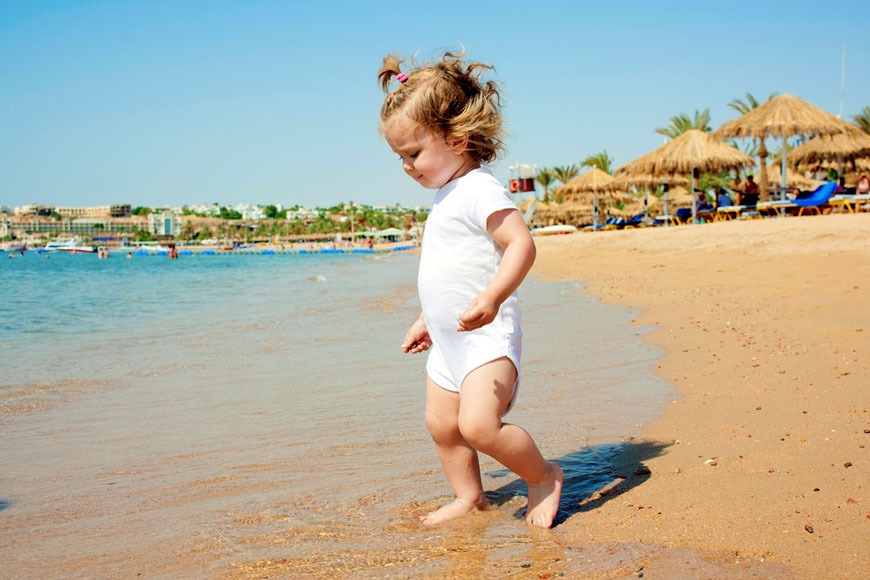Does Your Child Need Vitamin D Supplements In the UAE?
Nearly 80% of UAE residents are vitamin D deficient. Here's how to properly supplement your kid the sunshine vitamin during winter
16 January 2020

It is no secret that vitamin D is important for babies and kids' health
Referred to the sunshine vitamin, babies in the womb children need vitamin D to help them better absorb calcium, for bone growth, and for healthy teeth.
The UAE's usually warm weather can often encourage children to spend a lot of time indoors (more so during the hot summer), wear clothes that will cover their skin from sunburns, and slather on sunscreen, leading to lower vitamin D levels.
Vitamin D deficiency in children can cause rickets or soft bones, muscle weakness, delayed motor development, and can even be the cause of autoimmune disorders, cardiovascular disease, and osteomalacia when they become adolescents and adults.
Our human bodies naturally produce vitamin D when we're under the sun's ultraviolet (UV) rays. But previous studies from the Dubai Health Authority (DHA) show that nearly 80% of UAE residents are vitamin D deficient, particularly in the winter when the typical sunny weather is replaced by hazy skies, cold winds, and rain. That's not enough sun exposure for kids to get enough vitamin D.
Here's how mums can incorporate more of the sunny vitamin into children's routine using both supplements, activities, and diet to make sure your kid is getting healthy levels of vitamin D.
How much vitamin D is enough for children?
Although you can get vitamin D naturally from the sun and from foods, the reality is most people in the UAE don’t get enough of it, which is why some residents take supplements.
No matter where you live in the emirates, mums have to be careful about how much UV rays your child gets on his or her skin. Too much exposure to the sun can lead to sunburn, skin damage, and skin cancer.

Health professionals typically recommend 400 IU per day for breastfed babies who are less than a year old, and 600 IU per day for kids, adults, and the elderly from 1 to 70 years old.
Most milk formula for infants are already fortified with vitamin D, thus formula-fed babies will not need a vitamin D supplement. More isn't always better as too much of it can lead to vitamin D toxicity in babies and children.
Best foods with vitamin D
Food with lots of vitamin D in them can help drive your child's vitamin D levels towards the healthy range. Here are some foods with vitamin D (naturally and fortified) that we recommend you add to your kid's diet:
- Fresh fatty fish, including salmon, tuna, sardines, and mackerel.
- Low-fat dairy products - soy yoghurt, almond milk, etc./li>
- Some breakfast cereals.
- Some vegetables, such as broccoli, spinach, and kale.
- Egg yolks.
- Beef liver.
- Cod liver oil.
- Portobello and chanterelle mushrooms.
The UAE also has vitamin D fortified water available in most supermarkets and grocery stores, such as the Al Ain Plus Vitamin D water (considered the first of its kind in the world). Drinking these at least once a day is an adequate way of helping boost your child's vitamin D levels.
While baby formula already contains it, the amount of vitamin D found in a mother's breastmilk is dependent on her own vitamin D levels. Most breastfed infants usually won't get enough of the sunshine vitamin if they only consume breastmilk.

Vitamin D supplements for children in the UAE
Thankfully, pharmacies across the UAE offer a wide variety of Vitamin D supplements for children, available as gummies, drops, and tablets.
Parents can choose to opt for Vitamin D gummies. Kids usually prefer vitamin gummies for their sweetness and colours.
Formulated drops are quick and easy. Parents can place a drop on a pacifier and allow their infant to suck on it for around 30 seconds, or place it directly in their mouth. Older children usually only require a drop under their tongue, however, the requirements vary per product and must be checked by the parent.

























.png?itok=SvZPqMHH)





.png?itok=uB2ieOR7)












